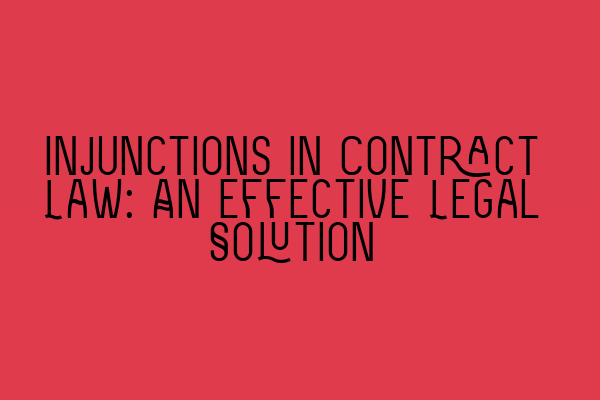Injunctions in Contract Law: An Effective Legal Solution
Contracts are the backbone of any business transaction, providing a clear understanding of rights and obligations for all parties involved. However, there may be times when one party fails to fulfill their contractual obligations, leading to potential financial loss or harm for the other party involved. In such situations, seeking an injunction can be an effective legal solution to protect the rights and interests of the aggrieved party.
What is an Injunction?
An injunction is a court order that requires a party to do something or refrain from doing something. In contract law, an injunction can be obtained to prevent a breach of contract, enforce specific performance, or protect proprietary interests. It is a powerful legal tool that can not only prevent further harm but also preserve the status quo until the dispute is resolved.
When a breach of contract occurs, the injured party may suffer financial losses or irreparable harm that cannot be adequately compensated by monetary damages alone. In such cases, seeking an injunction becomes crucial to prevent the potential harm from escalating and ensure that the defaulting party complies with their contractual obligations.
The Types of Injunctions in Contract Law
There are several types of injunctions that can be sought in contract law, depending on the circumstances of the case:
- Prohibitory Injunctions: These injunctions are granted to prevent a party from performing a specific action that would breach the contract. For example, if a party is planning to disclose confidential information that would violate a non-disclosure agreement, the injured party can seek a prohibitory injunction to prevent the disclosure.
- Mandatory Injunctions: Unlike prohibitory injunctions, mandatory injunctions require a party to perform a specific action as required by the contract. For instance, if one party fails to deliver goods as per the terms of the contract, the other party can seek a mandatory injunction to enforce specific performance.
- Freezing Injunctions: These injunctions are commonly used to preserve assets or prevent a party from dissipating assets during a contractual dispute. Freezing injunctions aim to prevent the defaulting party from disposing of their assets to avoid paying damages or other financial obligations.
- Anton Piller Injunctions: An Anton Piller injunction is sought to preserve evidence in cases where there is a risk that the defaulting party may destroy or tamper with evidence before trial. This type of injunction allows the aggrieved party to enter the premises of the defaulting party and seize relevant documents or evidence.
Seeking the appropriate type of injunction in contract law requires a comprehensive understanding of the legal principles and the unique circumstances of the case. It is essential to consult with an experienced contract law solicitor who can guide you through the process and help you make informed decisions.
Benefits of Seeking an Injunction
There are several benefits of seeking an injunction in contract law:
- Prevention of Further Harm: By obtaining an injunction, the aggrieved party can prevent the defaulting party from causing additional harm or damage. This can help mitigate potential financial losses and protect the interests of the injured party.
- Preservation of Evidence: In cases where there is a risk of evidence being destroyed or tampered with, an injunction can ensure that relevant evidence is preserved for trial. This is particularly important in contract disputes where proving the breach of contract and the resulting damages requires solid evidence.
- Preservation of Business Relationships: Seeking an injunction can also send a strong message to the defaulting party, emphasizing the seriousness of the breach and the commitment to protect one’s rights. This can lead to a resolution of the dispute without further litigation, preserving the business relationship between the parties.
Conclusion
Injunctions can be an effective legal solution in contract law, allowing parties to protect their rights and interests in cases of breach of contract or non-compliance. Whether you require a prohibitory injunction, mandatory injunction, freezing injunction, or Anton Piller injunction, consulting a contract law solicitor is essential for navigating the legal complexities and ensuring the best outcome for your case.
For further insights into legal practice and decision-making, check out our article on Unveiling Real-Life Case Studies: Insights into Legal Practice and Decision-Making.
If you’re interested in exploring solicitor salaries in the UK and the factors affecting income, take a look at our article on Exploring Solicitor Salaries in the UK: Average Earnings and Factors Affecting Income.
To enhance your client relationship management skills as a solicitor and build trust and loyalty, our article on Mastering Client Relationship Management: Skills for Solicitors to Enhance Trust and Loyalty provides valuable insights.
If you’re considering a law school education in the UK and want to choose the right path for your future, our article on Pursuing a Law School Education in the UK: Choosing the Right Path for Your Future offers valuable guidance.
Lastly, if you’re interested in securing training contracts and embarking on the journey to become a solicitor, our article on Securing Training Contracts: A Roadmap to Becoming a Solicitor provides a comprehensive roadmap to help you navigate the process successfully.
